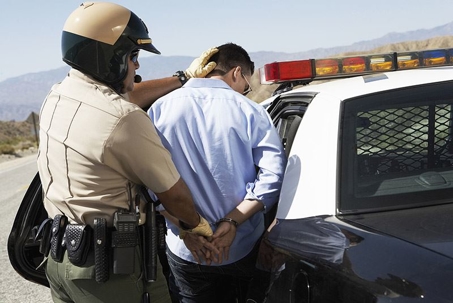Most Arizona DUI arrests begin like any other traffic stop. You likely experienced a jump in your heart rate when you saw those blue lights flash, but as with any other violation, you must do your best to remain calm and composed. In an effort to help determine sobriety, officer training includes close observation of every move you make and word you speak.
What Happens after You’re Pulled Over?
If an officer suspects that you’ve committed DUI (driving under the influence), he or she has you pull over. From that moment, the officer is on alert for any signs of intoxication, starting with the way you stop your vehicle. They will look for things like abrupt stops, how far from the curb you are, did you stop blocking a driveway or street, etc.
Upon approaching your vehicle, the officer typically requests license, proof of insurance, and proof of registration (all requirements for operating a vehicle in Arizona). Again, he or she watches you closely, looking for actions such as difficulty finding these documents, as well as remaining alert to physical signs of intoxication, including bloodshot or watery eyes, slurred speech, and the smell of alcohol.
If the officer suspects DUI, he or she then asks if you’ve been drinking and may request that you exit your vehicle. This is another opportunity for the officer to detect signs of intoxication or impairment due to drugs, as exiting a vehicle often causes impaired drivers to stumble or experience similar difficulty.
The Field Sobriety Test
From there, the officer likely will request a field sobriety test. At Edwards & Petersen, we recommend every client refuse to take this test. Even sober drivers often fail a field sobriety test, as these tests are highly unreliable, with the results reliant on the discretion of the officer conducting the test. In addition, Arizona law does not require drivers to submit to these tests. Yes, refusal nearly always results in an arrest for DUI. And yes, you will have to take the chemical test at the station. However, these tests are far more reliable than the field test and offer you a much greater chance to beat DUI charges. Additionally, given the tests only gives officers more evidence to sit to justify the arrest. a
The DUI Arrest Processing Site
If you are arrested, the officer should restrain you and recite your Miranda rights. He or she then transports you to the DUI processing site, where the officer questions you, unless you invoke your right to only speak with your attorney present, which we obviously recommend. In every instance, however, even when refusing to answer questions, remain polite and non-confrontational.
If you opt to answer questions, officers typically read from a standard set of questions, with another officer recording your answers. Throughout the process, from the time the officer pulls you over, everything you say and do is potential evidence if your case goes to trial. This is another reason to behave in a polite and respectful manner.
Taking the Chemical Test
At the DUI processing site, you will be asked to take another sobriety test. Even here, Arizona law does not require you to submit to this test. However, if you refuse your license is immediately suspended for 12 months. It is also likely your refusal will be used as evidence during your trial, with the prosecutor claiming you had something to hide. In the end, your refusal likely won’t matter, because law enforcement typically obtains a search warrant allowing them to conduct the test anyway. For all of these reasons, Edwards & Petersen strongly recommends submitting to this chemical test.
The most common tests are breathalyzer or blood draw, though a urine test is possible. The test measures your blood alcohol concentration (BAC). Nationwide, a BAC over 0.08 indicates impairment. If your test indicates a BAC over 0.08, you likely face a 90-day suspension of driving privileges, which goes into effect 15 days after you receive notification of the suspension. If your BAC is under 0.08, you do not face suspension unless you are convicted of DUI. These penalties are the same even if your driver’s license was issued in another state.
What Happens Next?
If this is your first standard DUI offense, the arresting officer and prosecutor typically investigate your prior record before filing charges. You then receive a citation and a court date. If the charge is felony DUI, such as aggravated or extreme DUI, the case is tried in superior court and carries harsher penalties.
If you face DUI charges, even if your BAC exceeds 0.08, you need an attorney fighting for your rights. Schedule a free consultation with Edwards & Petersen. We will discuss the details of your case and potential next steps.

